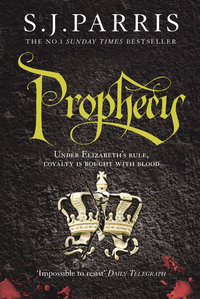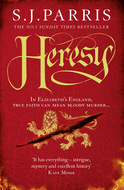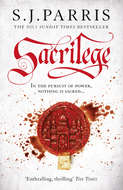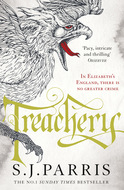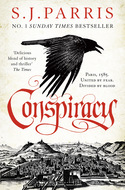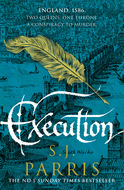Kitap dosya olarak indirilemez ancak uygulamamız üzerinden veya online olarak web sitemizden okunabilir.
Kitabı oku: «Prophecy», sayfa 6
‘Ah, you had better have that from the horse’s mouth.’ He grins. ‘Only Douglas can give that tale the savour it deserves. I’m sure your chance will come. Well – we shall meet again soon, Bruno. Meanwhile, bring me word if any Spanish envoy sets foot in Salisbury Court. Good luck.’ He nods briefly, turns on his heel and is swallowed into the colourful jostling crowds.
The sun has sunk lower over the rooftops as evening eases in, washing London in forgiving amber light that flashes from window panes as I make my way home through the city. On a day such as this, I begin to think I could perhaps learn to feel at home here. Above me, a riot of painted signs creak gently in the breeze, emblazoned with bright pictures proclaiming apothecaries, chandlers, barber-surgeons, merchants of cloth and wine and taverns named for animals of every kind and hue – black swans, blue boars, red foxes, white harts, hounds, hares, cocks and even unicorns. At each side of the thoroughfare a steady stream of people press by: street vendors crying their wares, men with cages of squawking chickens swinging from poles across their shoulders, women with baskets of oranges balanced on their heads and pedlars with wooden trays fastened around their necks full of all kinds of oddities – combs, quills, buttons, brushes and knives, sometimes all jumbled together. In the vast churchyard of St Paul’s, which is more like a marketplace, beggar children thread barefoot through the crowds, importuning the better-dressed ladies and gentlemen, while on one corner a ragged man stands playing a battered old lute and singing a forlorn song, hoping to be thrown a few coins. The smell of cooking meat fights with the stink of rotting refuse, and the richer sort hold pomanders and posies of flowers close to their noses to keep the vapours at bay.
As I cross the courtyard, past where the former shrines and chapels are now fallen into disrepair or turned into stalls for booksellers and traders, a pamphlet-seller steps in front of me, thrusting his wares in my face. I almost dismiss him, but the image on the front of his pamphlet catches my eye and I take one to look more closely. Here, again, are the symbols of Jupiter and Saturn conjoined, beneath a bold title: End of Days? The fellow selling it holds out a hand for his penny, his fingers waggling impatiently. He has his hood up, despite the sun; a wise precaution, since I can see at a glance that neither the printer nor the author has dared put his name to this piece of work, meaning that it is printed illegally. Intrigued, I scrabble for a coin and walk away, bumping into people as I read the thing. The anonymous author writes with a doom-mongering tone: he has attempted to cast the queen’s horoscope from her nativity and tie his dramatic predictions to the coming of the Fiery Trigon, the terrifying alignment of the great planets whose symbols decorate the front. Queen Elizabeth’s days are numbered, he writes; God will smite England with war and famine and her disobedient subjects will cry out for a saviour. Inside, there is a woodcut of a devil prodding a man with a pitchfork. I tuck the pamphlet into my jerkin to save for Walsingham, though I imagine if he has not already seen it, he soon will.
I have barely closed the front door behind me at Salisbury Court when Courcelles materialises out of the shadows beside the staircase, as if he has been waiting for my arrival.
‘There is a boy here says he has a letter for you,’ he announces, resting one delicate white hand on the carved wooden eagle that decorates the end of the banister. ‘He has been here the best part of the afternoon and, try as we might, we could not persuade him to leave it for you, not even for a shilling. Nor will he tell us who sent him. He says his instructions are to put it into your hands alone and it was a most urgent and confidential matter.’ His fine eyebrows arch gracefully as he says this; evidently he expects me to offer some explanation.
‘Then I had better see him,’ I reply evenly, though my pulse quickens. I think first of Walsingham, then Sidney, then Dee; any one of them might want to contact me as a matter of urgency, but Walsingham would surely not arouse suspicion by sending an obviously secretive message directly to the embassy, and Sidney is still on his honeymoon, as far as I know. That leaves Dee, and my gut clenches; has Ned Kelley done something to him?
Courcelles presses his lips together and points me in the direction of the stables at the side of the house. There I find a skinny boy of about twelve years old sitting miserably on a straw bale, picking at his fingernails while the stable hands jeer at him in French. He shows signs of having been in a scuffle.
‘I am Bruno. You have something for me?’
He leaps to his feet as if stung, and pulls a crumpled letter out from inside his jacket. He wears no livery but he is not poorly dressed. He beckons me closer and passes me the letter as if it contained secret intelligence.
‘From Abigail Morley.’ His voice is barely a whisper. ‘She said I must only put it in your hands, sir, though they tried to take it from me.’ He glances resentfully at the stable boys, who twist awkwardly and look away.
‘You did well.’ I find a coin for his trouble and see him out of the side gate, before pausing in a pool of shadow, away from curious eyes, to tear open the letter. It is written in an elegant, curling hand; Abigail asks me to meet her tomorrow at eleven in the morning at the Holbein Gate, Whitehall. She says she is afraid.
FIVE
Whitehall Palace, London
28th September, Year of Our Lord 1583
Another morning of empty blue skies and warm light; I take a wherry upriver to Whitehall, landing at Westminster Stairs, the nearest public jetty to the palace. The River Thames is wide and calm, jewelled with reflections of the sun and white ripples where the breeze ruffles the water’s surface, and I lean back in the boat as the oarsman heaves his way through the flotilla of small craft transporting goods and passengers up and down London or eastwards, out towards the docks.
From the stairs I walk back up King Street past the boundary walls of the palace to the Holbein Gate, a vast, imposing structure that spans the main thoroughfare out of London to the west, joining the sprawling privy apartments and state chambers of Whitehall with the tiltyard and the park of St James on the other side. Three storeys of red brickwork and white stone, with an octagonal tower at each corner in the English style, and grand rooms above the main archway, the gatehouse is patrolled by palace guards and always densely crowded, as all travellers on the road must be funnelled through it to pass in either direction. Abigail has chosen wisely; often the best place to pass unobserved is in a crowd.
From somewhere nearby a church bell chimes the hour of eleven and I wait, hesitant, by the passageway through the eastern tower of the gatehouse, which is reserved for those on foot. Through the central archway, carts pulled by horses or mules churn up clouds of dust from the dry road as traders bring their goods into the palace or on towards the city. People bustle past with bundles or packs and I press myself back against the wall, out of the way; suddenly an old woman with no teeth thrusts a filthy hand into my face, demanding money or food and I jump back, startled. I know from experience that if I reach for a penny, a hundred more beggars will stream in an instant from the shadows with their hands out, but there is such desperation in her face that I cannot refuse; she folds her fingers with their swollen joints painfully around the coin I slip into her palm, clutches at my jacket and pulls me towards her.
‘When hempe is spun, England’s done,’ she croaks into my face, so that I have to reel back from her stinking breath. ‘Take heed, sir. The signs are all about us.’ She points one trembling, crooked finger to the sky, then releases me and scuttles back into the crowd.
I stare after her, puzzling over her words, when another figure wrapped in a thin cloak approaches and guiltily I regret my generosity; here they come already, and I don’t have enough coins to part with them all. But this woman sidles up to me, reaching inside her clothes, and from the depths of her hood whispers my name in an educated voice.
‘Abigail!’
‘Shh. We must not be seen. Walk with me into the passage for a moment.’
We step into the shadow of the tower archway; immediately the deep chill of damp stone settles on my skin. The passage through the tower is not wide and we are jostled and shoved, with the occasional curse, as we huddle at one side. Abigail keeps her hood pulled up around her face.
‘They have the wrong man,’ she whispers, without preamble. ‘I didn’t know who else to tell.’
‘How do you know?’
‘Because Sir Edward Bellamy tried to court me once, and we laughed about it – I mean, Cecily and I. It was cruel of us, but he is such a poor figure of a man. No woman would want him, for all his lands, unless she were past caring.’ She rubs self-consciously at her throat as she says this. ‘But Sir Edward is a gentleman and does not deserve to have this pinned on him. He was not her secret sweetheart, I would swear to it.’
‘But her lover was not necessarily her killer. It need only have been someone who knew she had a tryst that evening. The lover could have been one of Sir Edward’s friends, perhaps?’
The bottom half of her face is visible below the hood; she chews her lip doubtfully.
‘I just do not believe he could kill anyone, or be party to it. He is so mild-mannered.’
‘Quiet men have murdered before.’
She shakes her head decisively.
‘It doesn’t feel right. He sold Cecily his old clothes so she could disguise herself as a boy – that much I believe. But I think the palace guard were just glad to make an easy arrest so the queen will think they are doing their job. Anyway, I did not ask you here for that. There is something else.’
She beckons me closer and from inside her cloak draws out a little velvet bag tied at the top with ribbon.
‘Lady Seaton went through Cecily’s things to give her father when he came.’ She speaks so low that her face is almost touching mine to make herself heard. Her breath is warm on my cheek. ‘But I suspected she was looking for something that might give away Cecily’s affair. She found nothing. She didn’t know about the cushion.’
‘What cushion?’
‘It was one of Cecily’s most beloved things – a little cushion that she embroidered as a child. A bible text, flowers, you know the sort of thing. She kept it on her bed – I thought it was just a sentimental keepsake, for when she was homesick, but one day she showed me how she would unpick the seam and hide her secret gifts inside the cushion cover.’
She holds out the bag; I weigh it in my hand. It is light and chinks softly as I move it.
‘These are the presents from her admirer, everything she had sewn inside the cushion. I don’t know what use they may be – I can see no clue in them, but perhaps you might find something. Especially since everyone seems determined to find Sir Edward guilty – it would be a terrible thing if he were to take the punishment for it.’ She tugs at my sleeve, and there is something childlike in the gesture. ‘There is a design on the ring, an emblem. It is not the Bellamy arms, though it is no one’s I recognise. But you could give it to Lord Burghley – he might know.’
‘He might. Have you told anyone else about these things?’
She bites her lip and looks away, but then she shakes her head firmly. Again I have the sense that she is holding something back.
‘I almost did when they arrested Sir Edward, but I could not approach Lord Burghley myself. Besides, I remembered what you said. If the killer is someone inside the court, he might know that Cecily was my friend, might he not? So he might think she had told me her secrets and want to stop my mouth too?’ She raises her face to me and in the dim light I see how pale she is, how her lips are trembling, though she tries to fight it.
‘You are brave to have brought me Cecily’s things – thank you. I have no doubt that they will be invaluable.’ I place my hands on her small shoulders to reassure her. ‘As for the danger, I think it more likely that this killer, if it is not Sir Edward, will be glad to let another man take the blame and remain in the shadows. Why would he risk drawing attention to himself with another attack when he has the chance to get away with murder?’
‘I suppose that would depend upon why he killed Cecily in the first place,’ she says, sensibly. ‘I mean, a man might kill a woman because she is with child and he doesn’t want to marry her – you hear such stories. There was a great deal of that kind of talk at first around court. But that spectacle he made of her body –’ she shudders – ‘makes me think it must be something else. What if he killed her because she knew something she should not? He would want to silence her friends then, sir, would he not, in case she had shared confidences?’
Looking down at her earnest face, I begin to think that I have underestimated Abigail Morley. These have been my own thoughts; I have even wondered about Lady Seaton, whether her defensive manner on the night of the murder was all to do with the fear of salacious gossip, or whether it masked another motive. I squeeze the girl’s shoulders gently.
‘Why do you say that? Did Cecily give you reason to think she was guarding dangerous secrets?’
‘It was only that –’ she hesitates, glances around – ‘since she met this man, she had begun to talk a lot of prophecies.’
‘What kind of prophecies?’
‘Oh, you know the kind of thing, they’re two a penny – that the queen’s days are numbered, that England will be destroyed. You hear such stuff on every street.’
‘I heard one just now, I think, from an old crone. “When hempe is spun, England’s done.”’
Abigail nods enthusiastically.
‘That is a favourite among the servants. You know what it means, of course?’ She drops her voice. ‘It’s the Tudor line. Hempe stands for Henry, Edward, Mary and Philip, and Elizabeth. The old granddams quote it to predict England’s downfall when the last Tudor dies. Cecily knew them all.’
‘But she only showed an interest in such things recently?’
‘This past month or so. I wondered what ideas this man had been putting in her head. I would tell her, “Cecily, some of these things you’re saying could be treason!” She just laughed at that, as if she didn’t care, and told me everyone was talking of it.’
‘Did she mention religion? Or who she thought should take the throne instead?’
‘No, nothing like that. It was more of a personal resentment,’ Abigail adds, then claps a hand to her mouth. ‘I don’t know if I should tell you this.’
‘Abigail.’ I look her directly in the eyes. ‘It would be as well to tell me anything that might help. Why did she resent the queen?’
‘When Cecily first came up to court, last year,’ she whispers, drawing in closer to me as a group of boys in the garb of apprentices elbow their way past, ‘she had a sweetheart from home, some gentleman’s son she’d known since she was a child. He got himself to London in the hope of seeing her, but when Lady Seaton heard of it she told the queen and they had him turned away. Cecily was forbidden even to write to him. He wasn’t high-born, you see. She forgot him quickly enough, but she didn’t forget her resentment of the queen for it. And she was afraid the queen might interfere with this new man as well.’ Her eyes flit from side to side. ‘For being too high-born for her.’
I cannot help but laugh at this.
‘I had no idea love was so minutely calibrated. Must you all measure your husbands’ status so carefully?’
She giggles, sounding for a moment light-hearted.
‘I may not choose my husband for love, but I shall make damned sure I choose my lover carefully. What? Would you look so shocked?’ she adds, in response to my expression, which makes her giggle all the more. ‘No need to be such a prude, even if you were once a monk.’
‘Are you going to stand there blocking the way all day, then?’ grumbles a heavy-set man in a coarse smock as he lumbers past, knocking Abigail hard enough that she stumbles into my arms as I try to stop her falling. Startled, she regains her balance and brushes herself down as we look at one another, then quickly glance away.
‘I should probably –’ she says, gesturing back towards the palace wall.
‘Yes. But take care, Abigail. Make sure you do not go about the palace alone. Someone at court knows who killed Cecily and why, and you are right – he may be watching you. Be wary about who you trust.’
‘It is hard to know who to trust at court after this.’ She laughs, a nervous, high-pitched sound, her fingers twisting at the strings of her cloak. ‘I mean, how do I even know that I can trust you?’
‘You can trust me, Abigail. I have no pledge to give except my word.’ Gripping her shoulders a little tighter, I make her look into my eyes. She searches them with her pale green gaze, and eventually she nods.
‘Yes – it is odd, for all the women say never trust foreign men, especially those from Spain or Italy. But I feel I can trust you. Will you let me know if you learn anything more? It would help me to feel safer.’
I am about to promise, when two young dandies in puffed satin push roughly by us, this time jostling Abigail into the wall.
‘Hey! Watch yourselves!’ I call after them; the shorter of the two, who wears a scarlet cap with a peacock feather, turns at my accent.
‘Do you speak to me, you Spanish whoreson?’ He pauses, spits on the ground and seems about to come back for me, but his friend restrains him, and with a last filthy look, they resume their walk.
‘Fools,’ I mutter, though I am grateful that they were not spoiling for a fight in the street. ‘Thank you for trusting me. And, Abigail – you must let me know if you remember anything more that Cecily told you. It could be essential.’
I speak gently, but she understands my implication: I think she is keeping something back, some clue to the identity of Cecily’s lover, either out of fear or misguided loyalty. She smiles hesitantly and I realise I am still holding her by the shoulders; our eyes meet again, for slightly too long. For a moment I entertain the absurd thought that, once this business is resolved, I might ask to see her again. There is something about her expectant eyes that makes me wonder if she has thought the same. I could hardly be considered the grand match her father has in mind, but has she not already made clear that she would have different criteria for a lover? I push to one side the uncomfortable suggestion that her father is probably not much older than I am. Embarrassed by my unspoken thoughts, I release her and she draws her hood up closer.
‘The perfume is disgusting, by the way,’ she says, as she turns to leave, nodding to where I have stuffed the velvet bag inside my jerkin. ‘Only a man could possibly think a woman would want to wear that.’ She laughs then, and with a little wave, steps out of the archway into the bright light of the morning.
I watch her as she disappears into the throng, then turn and make my way back in the opposite direction. It is only when I emerge into the light at the other end that I sense someone behind me; quick as blinking, I spin around, but there are dozens of people in my wake, none of them paying the slightest attention to me other than to tut at the fact that I have stopped dead in the path, interrupting the flow of human traffic again. I turn urgently left and right, craning my neck above the crowd, knocking into people as I go, but all I can see is a steady stream of faces coming towards me from the gatehouse passageway. None of them makes eye contact. It is possible that I imagined the sensation. Yet I know, instinctively, that there was someone at my back, just now, watching me, and he must have seen me talking to Abigail Morley.
I hail a boat back to Salisbury Court, thinking that it would be harder for anyone to follow me inconspicuously by river, but although I spend the journey peering out at the other wherries and their passengers until even the boatman grows nervous and asks what is the matter, I see nothing to give me any cause for concern. By the time I arrive back at the embassy, I have almost persuaded myself that I was mistaken.
Halfway across the first-floor gallery, with my fingers burning to examine the contents of the velvet bag, which I have not dared to open in any public place in case I was being followed, I hear a woman call my name. So fixed am I on reaching the privacy of my room in order to examine its contents that I nearly curse aloud at being detained. Marie stands in the doorway behind me, regarding me with her head on one side, her daughter’s little dog clasped in her arms. Reluctantly, I turn and bow.
‘Madame.’
‘Who was your mysterious letter from yesterday, Bruno? We are all dying to know.’ She advances on me, smiling coquettishly, and stops a little too close. She wears a dress of blue silk, and on her bodice is pinned a large jewelled brooch, studded with rubies and diamonds that glint and sparkle in the sun. The dog stretches out its small head and licks my hand in an enquiring manner. ‘I have speculated that you have some besotted English girl sending you verses, but Claude is quite convinced that it is something more intriguing. Who would be sending Bruno letters, he wonders, that could not divulge his name? Or her name.’ She widens her eyes in an affectation of intrigue.
I smile politely, but this is worrying: it will not do me any good to have the household speculating on my communications, especially in the midst of such conspiracies as I heard the other night. I begin to think it was a mistake to suggest that Abigail contact me here. Thinking as quickly as I can, I compose my expression into one of regret.
‘I only wish you were right, madame, but I’m afraid there is no besotted English girl. The letter came from a young man at court who has read one of my books and wishes to become my private student.’
‘One of your books?’ She looks disappointed.
‘As unlikely as that may seem.’
‘Student of what?’
‘Of the art of memory. Just as I taught to King Henri in Paris.’
‘Oh.’ She considers this. ‘Then why the secrecy?’
‘Because ignorant people mutter that the techniques of memory owe something to occult sciences. I expect he is being cautious. Though I assure you there is no truth in that,’ I add, hastily.
She continues to study me with her head tilted, as if I make more sense viewed at an angle.
‘Well, then, Bruno,’ she says, at length, ‘I insist that I become your private student too. I would like to learn your system. You can sort out the payment with my husband – although he may feel that the board and lodging you already receive are wages enough.’
‘Madame, I am not sure that would be –’
‘Don’t be tiresome, Bruno. It would be perfect – it is not as if you are employed elsewhere, and I must fill my time somehow while Katherine is with her governess. Besides, my memory is quite shamefully poor. I came after you to tell you something, and now I have quite forgotten what it was. You see? I need you.’ She smiles up at me with a twitch of her eyebrow, all innocent and knowing. Looking for a distraction, I reach out to stroke the dog and she does the same, with the result that her hand lightly caresses the top of mine; I pull my own hand back as if burned, and she blushes and drops her gaze. Christ, I think: the idea of trying to teach her anything, alone in a room, is more daunting than any task Walsingham could ask of me. I am reassured by the thought that Castelnau would never sanction it.
‘Anyway, where are you heading in such a hurry?’
‘Oh – just to my room. I had one or two ideas while I was out walking and I must write them down before they evaporate.’
Her laugh is musical. ‘You are not a very good advertisement for your own memory techniques, Bruno.’
‘You have been warned.’
‘Oh, I am not deterred. I only feel sorry for your young student – I hope he is not wasting his money. What was his name?’
I hesitate only for the space of a breath, but she is sharp enough to notice.
‘Ned. Ned Kelley. Well, madame, I must –’ I gesture towards the door at the other end of the gallery. It is a handsome room, running the length of the house at the front, with tall windows along the walls on both sides. Sunlight plays along the darkened panelling, dust dancing in perpetual motion in glittering shafts. The same light falls sidelong on Marie’s face and I have an urge to reach out and touch her cheek, not from desire but merely to see how soft it feels, lit up and golden. I take a step back as if to leave and she reaches out and grasps my sleeve.
‘There – now I have remembered what it was! The ambassador wishes to speak to you in his private office – he has been asking for you all morning but no one knew your whereabouts.’ She says this as a kind of accusation.
‘Then I will go to him shortly,’ I say, feeling the shape of the bag still pressing against my chest under my jerkin. ‘First I must change my shirt.’
She looks at my collar doubtfully.
‘While you are there, tell him I wish to take lessons in your arcane magical arts.’
‘Madame, there is no magic involved, whatever they say in Paris –’ I begin, earnestly, but then I catch sight of her impish smile.
‘Oh dear, Bruno – you are too easy to tease. I think I will enjoy our lessons.’
I reply with a curt bow, leaving her standing in a ray of light with her jewels glittering, still laughing to herself.
The velvet bag, when it is opened, reveals the items Abigail mentioned to me before: a gold signet ring with an engraved emblem; a tortoiseshell hand mirror, beautifully smooth; a small glass vial of perfume in the shape of a diamond, of the kind that women wear around their necks, with a gold clasp and a chain attached at the top. Love-tokens, clearly expensive, but what can these trinkets tell me of the story of Cecily Ashe and her lover? One by one, I hold them up to the light and examine them. The ring’s design is of a bird with outstretched wings and a curved beak, an eagle perhaps, and around the edge letters are carved in mirror image, so that they would read true when pressed into warm sealing wax. I frown for a moment, trying to decipher the motto, until I realise it is written in French: Sa Virtu M’Atire. ‘Her virtue draws me’ – or perhaps ‘its virtue’. But the word ‘attire’ is mis-spelled – a curious mistake. You would think if you were having a gold ring engraved, you would make sure the goldsmith carved it correctly; nor would any craftsman worth his fee want the expense of making such an error. So, I think, rotating the ring again while my eye follows the letters around, what appears at first glance to be a mistake must be by design, and therefore perhaps the motto has a hidden or coded meaning. If this is the case, it is not giving itself up to me easily; I am no nearer than Abigail to knowing whose emblem this is, though it seems the giver of the ring had a French connection. That hardly helps, of course – half the nobility have some French ancestry and everyone of the gentry class and above learns at least a few words.
The little mirror is the least interesting object. I turn it over in my hands but it yields nothing; the tortoiseshell is so highly polished that you can see your face almost as well in its swirling patterns of tawny brown as you can in the silvered glass. Frustrated, I put it to one side and open the perfume bottle. Raising it to my nose, I understand immediately Abigail’s complaint. Beneath the scent of rosewater is a hint of something bitter, a sour vegetable smell that makes you wince. But Abigail is wrong about a man’s ignorance of perfume; the giver of these gifts was clearly a man of taste and considerable generosity, so why would he present his love with a perfume that was so obviously unappealing? Tipping the bottle, I wet the end of my finger with a tiny drop of the colourless liquid and raise it to my tongue, but as I am about to taste it, there comes a sudden rap at the door.
‘Bruno? Are you in there?’
Dumas. I scrabble to stuff the gifts back into the velvet bag and in my haste I knock the little mirror to the floor, where it lands with an ominous crack.
‘One moment!’ Cursing silently, I retrieve it and turn it over to see with great relief that the glass has not broken, but the fall seems to have damaged the frame; it feels looser, as if the glass might slip out. But there is no time to look closer; I push the bag under the pillow of my bed and unbolt the door for Dumas. He stands, twisting his hands, with the face of a startled hare.
‘My lord ambassador sends for you. I don’t know what it is about. Do you think he has discovered our …’ he falters, looking for the right word.
‘Business? Well, let’s not immediately jump to the worst conclusion, eh.’ I give him a good clap on the shoulder for encouragement as I pass him in the doorway, though the fact that Castelnau has been looking for me all morning worries me, too. Dumas watches while I lock the door of my bedchamber. Secrets must be guarded closely in this house.
Castelnau looks up from his desk as I enter his private office, and his expression seems serious, though not angry.
‘Bruno! What an elusive man you are. Take a seat, will you?’ He indicates a chair by the empty fireplace, inlaid with tapestry cushions. Dumas hovers behind me, shifting from one foot to the other, as if unsure whether he is expected to stay. ‘Léon, you have work to do, don’t you?’
Ücretsiz ön izlemeyi tamamladınız.
